Related Research Articles

Airplane! is a 1980 American disaster comedy film written and directed by Jim Abrahams and brothers David and Jerry Zucker in their directorial debuts, and produced by Jon Davison. It stars Robert Hays and Julie Hagerty and features Leslie Nielsen, Robert Stack, Lloyd Bridges, Peter Graves, Kareem Abdul-Jabbar, and Lorna Patterson. It is a parody of the disaster film genre, particularly the 1957 Paramount film Zero Hour!, from which it borrows its plot, central characters, and some dialogue. It also draws many elements from Airport 1975 and other films in the Airport series. It is known for its use of surreal humor and fast-paced slapstick comedy, including visual and verbal puns, gags, running jokes, and dark humor.
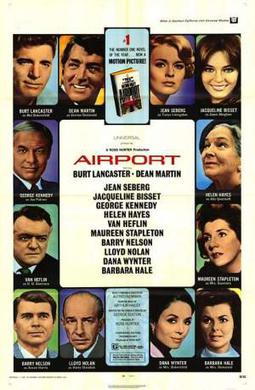
Airport is a 1970 American air disaster–drama film written and directed by George Seaton and starring Burt Lancaster and Dean Martin. Based on Arthur Hailey's 1968 novel, it originated the 1970s disaster film genre. It is also the first of four films in the Airport film series. Produced on a $10 million budget, it earned over $128 million. The supporting cast features Jean Seberg, Jacqueline Bisset, George Kennedy, Helen Hayes, Van Heflin, Maureen Stapleton, Barry Nelson, Lloyd Nolan, Dana Wynter and Barbara Hale.
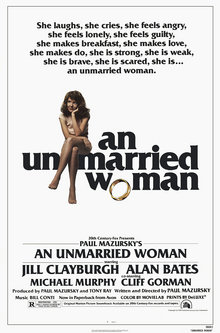
An Unmarried Woman is a 1978 American romantic comedy-drama film written and directed by Paul Mazursky and starring Jill Clayburgh, Alan Bates, Michael Murphy, and Cliff Gorman. The film was nominated for three Academy Awards: Best Picture, Best Original Screenplay, and Best Actress (Clayburgh).
A disaster film or disaster movie is a film genre that has an impending or ongoing disaster as its subject and primary plot device. Such disasters may include natural disasters, accidents, military/terrorist attacks or global catastrophes such as a pandemic. A subgenre of action films, these films usually feature some degree of build-up, the disaster itself, and sometimes the aftermath, usually from the point of view of specific individual characters or their families or portraying the survival tactics of different people.
Anne Lockhart is an American actress. She is best known for her role as Lieutenant Sheba in the 1978–79 television series Battlestar Galactica.
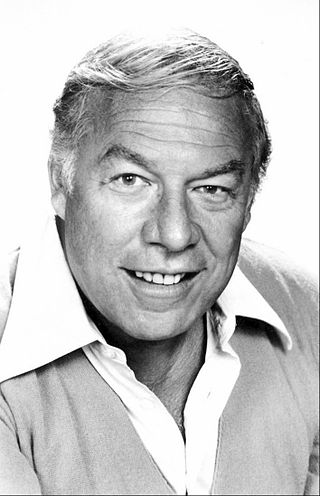
George Harris Kennedy Jr. was an American actor who appeared in more than 100 film and television productions. He played "Dragline" in Cool Hand Luke (1967), winning the Academy Award for Best Supporting Actor for the role and being nominated for the corresponding Golden Globe. He received a second Golden Globe nomination for portraying Joe Patroni in Airport (1970).

Funny Lady is a 1975 American biographical musical comedy-drama film and the sequel to the 1968 film Funny Girl. The film stars Barbra Streisand, James Caan, Omar Sharif, Roddy McDowall and Ben Vereen.
An airport is a location where aircraft take off and land. Airport may also refer to:
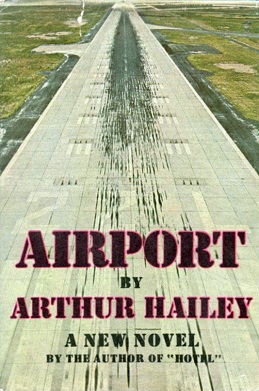
Airport is a novel by British-Canadian writer Arthur Hailey. Published by Doubleday in 1968, the story concerns a large metropolitan airport and its operations during a severe winter storm.

John Ronald Smight was an American theatre and film director. His film credits include Harper (1966), No Way to Treat a Lady (1968), Airport 1975 (1974), Midway (1976), and Fast Break (1979).

Airport 1975 is a 1974 American air disaster film and the first sequel to the successful 1970 film Airport. It was directed by Jack Smight, produced by William Frye, executive produced by Jennings Lang, and written by Don Ingalls. The film stars Charlton Heston, Karen Black, George Kennedy and Gloria Swanson – as a fictionalized version of herself – in her final film role.
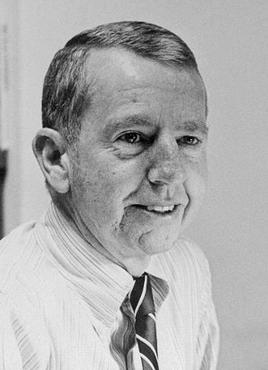
Vincent Canby was an American film and theatre critic who served as the chief film critic for The New York Times from 1969 until the early 1990s, then its chief theatre critic from 1994 until his death in 2000. He reviewed more than one thousand films during his tenure there.

The Concorde... Airport '79 is a 1979 American air disaster film and the fourth and final installment of the Airport franchise. Although critically panned and earning poorly in North America, the film was a commercial success internationally, grossing a total of $65 million on a $14 million budget.

The Fury is a 1978 American supernatural horror thriller film directed by Brian De Palma and starring Kirk Douglas, John Cassavetes, Amy Irving, Carrie Snodgress, Charles Durning, and Andrew Stevens. The screenplay by John Farris was based on his 1976 novel of the same name.

Someone to Watch Over Me is a 1987 American neo-noir romantic thriller film directed by Ridley Scott and written by Howard Franklin. It stars Tom Berenger as a police detective who has to protect a wealthy woman, who is a key witness in a murder trial. The film's soundtrack includes the George and Ira Gershwin song from which the film takes its title, recorded by Sting, and Vangelis' "Memories of Green", originally from Scott's Blade Runner (1982).

Swing Shift is a 1984 American romantic drama directed by Jonathan Demme, and produced by and starring Goldie Hawn, with Kurt Russell. It also features Christine Lahti, Fred Ward, Ed Harris and Holly Hunter, in one of her earlier movie roles. The film was a box office bomb, grossing just $6.6 million against its $15 million budget. Lahti earned a nomination for the Academy Award for Best Supporting Actress.

La Cage aux Folles II is a 1980 French comedy film and the sequel to 1978's La Cage aux Folles. It is directed by Édouard Molinaro and stars Michel Serrault as Albin, the female impersonator star of a gay night-club revue, and Ugo Tognazzi as Renato, his partner of over 20 years.
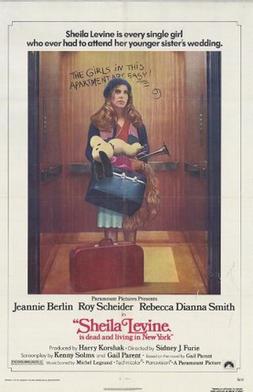
Sheila Levine Is Dead and Living in New York is a 1975 black comedy film directed by Sidney J. Furie about a shy young woman who moves to New York City and falls in love with the boyfriend of her extroverted roommate. The film was co-written by Kenny Solms and Gail Parent, adapted from Parent's 1972 novel of the same name. The film was shot on location in New York City.

Rod Steiger was an American actor who had an extensive career in film, television, and stage. He made his stage debut in 1946 with Civic Repertory Theatre's production of the melodrama Curse you, Jack Dalton!. Four years later, he played onstage in a production of An Enemy of the People at the Music Box Theatre. A small role in Fred Zinnemann's Teresa (1951) marked his film debut. In 1953, he played the title role in the teleplay "Marty" to critical praise. His breakthrough role came with the crime drama On the Waterfront (1954), which earned him an Academy Award for Best Supporting Actor nomination, and subsequent appearance in Fred Zinnemann's musical Oklahoma!.
Aviation accidents and incidents, particularly civilian airplane crashes or incidents threatening a crash or requiring an emergency landing, are a common theme in fiction. Films centered on such incidents make up a substantial subset of the disaster film genre, and influence how other stories within the genre are told. Works in this genre encompass both fictional depictions of the incidents themselves, and depictions of consequences such as investigations, lawsuits, and the effect on the lives of persons involved. A subgenre, the "plane crash survival movie", involves characters placed in a dangerous environment by an initial airplane crash. Airplane crashes have been described as "the easy and obvious device" for dramatically incorporating an airplane into the plot of a film, and as "a Hollywood staple", with various levels of praise or criticism directed to the realism of specific depictions.
References
- ↑ Canby, Vincent (March 6, 1970). "The Screen: Multi-Plot, Multi-Star 'Airport' Opens: Lancaster and Martin in Principal Roles Adaptation of Hailey's Novel at Music Hall". The New York Times . Archived from the original on November 2, 2013. Retrieved August 31, 2009.
- ↑ Stafford, Jeff. "Airport". TCM.com. Turner Classic Movies.
- ↑ "Airport 'junk' — Lancaster". The Montreal Gazette . March 8, 1971 – via Google News.
- ↑ Kael, Pauline (October 28, 1974). "Airport 1975". The New Yorker .
- ↑ Canby, Vincent (October 19, 1974). "Airport 1975 (1974) Screen: 'Airport 1975' Is a Silly Sequel With a 747". The New York Times.
- ↑ "'Airport '77,' Starring a Jet, Fails to Maintain High Level". The New York Times. March 26, 1977. Retrieved June 7, 2015.
- ↑ Poll (August 1, 1979). "Review: "The Concorde – Airport '79"". Variety . p. 20. Retrieved July 11, 2013.
- ↑ Maslin, Janet (August 3, 1979). "The Concorde Airport 79 (1979) Screen: 'Concorde...Airport '79':Airplane on Skis". The New York Times.
- ↑ "Airport, Box Office Information". Box Office Mojo . Retrieved March 22, 2021.
- 1 2 3 4 "Universal's Foreign Champs". Daily Variety . February 6, 1990. p. 122.
- ↑ Warga, Wayne (June 21, 1970). "Freddie Fan of Filmdom Finds Lost Audience: The Lost Audience Discovered". Los Angeles Times . p. q1.
- ↑ "Airport 1975". The Numbers . Retrieved March 22, 2021.
- ↑ "Airport '77, Box Office Information". The Numbers . Retrieved March 22, 2021.
- ↑ "The Concorde: Airport '79, Box Office Information". The Numbers . Retrieved March 22, 2021.